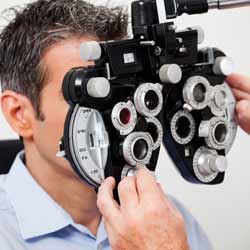Optician Careers
According to Essilor USA, impaired vision is the most widespread disability in the world. It affects 4.2 billion people on our planet.
In the US, 3 out 4 people wear contact lenses or glasses and that number is increasing. Luckily, nearly 80% of those impairments can be avoided or cured. A trained optician can fix many of these common visual impairments.

An optician designs, fits, adjusts, repairs, recommends, verifies, and distributes corrective lens to patients. An optician works directly with clients to fill prescriptions from eye doctors like ophthalmologists or optometrists. Since the 1350’s, opticians have helped people see the world.
These eyesight experts help people deal with vision impairments like digital eye strain, astigmatisms, glaucoma, low vision, and other eye issues. If you suffer from any of these things, you know the true value of a professional optician.
When a client needs contact lens, spectacles, low vision aids, or monocles, they visit a practicing optician at eye care centers, retail stores, hospitals, lens franchises, private practices, or optometrist offices. There they can get their eyes tested and purchase the correct corrective lens.
Opticians work with a variety of equipment to perform their job. They use lensometers, pupilometers, keratometers, and biomicroscopes on a daily basis. These devices help to measure pupillary distance, verify prescriptions, orient and cut lens, confirm mounts, and do other important tasks. Opticians also help to adjust and repair eyewear. Based on their assessments, they can then send special orders off to opthalmic labs.
Opticians need to be professional and friendly at all times. They also need to know a bit about style. Part of an optician’s job is to assist clients with frame selection and tints based on facial structures, lifestyle, occupation, hobbies, colors, and other factors. People want glasses that fix their vision and make them look good too.
People rely on their vision for safety. It’s a very valuable sense. This is why optician jobs are a regulated profession. To become an optician, you can earn a formal education through an approved program at a technical school, via distance learning, or at a university. Alternatively, you can learn the optician trade through in-depth apprenticeships. Either way, opticians learn about optical science, eye physiology, equipment usage, corrective lens, and other necessary topics.
After they learn the necessary skills, they can earn a certification from ABO-NCLE, or American Board of Opticianry and National Contact Lens Examiners. When an optician combines a university degree with the ABO-NCLE certification, they can earn credentials from the Society of Advance Opticianry. Continuing education is required every 3 years to ensure opticians stay up-to-date on their profession. Approximately half of the US states require a license. It’s up to you to determine if a license is necessary where you live.
Finally it’s time to find a job. Opticians work in eye care centers, retail stores, hospitals, private practices, and optometrist offices. In 2012, there were 67,600 practicing opticians in the US. According to the BLS, opticians make an average salary of $33,330 per year or $16.03 per hour. They expect optician job opportunities to grow by 23% by 2022.
Finding an optician job is a solid career move because it offers job security. Visual impairment is common and the services of an optician will always be in demand. This makes it a cool career to pursue. Plus, it’s rewarding to help people see. Are you ready to find optician jobs?
Quick Facts About Optician Careers
Job Title: Optician, Opthalmic Optician, Dispensing Optician, Optical Technician
Office: Eye Care Centers
Description: Design, fit, adjust, and distribute corrective lens
Certifications/Education: ABO-NCLE Certification
Necessary Skills: Knowledgeable about eyes and corrective lens, Personable
Potential Employers: Retail stores, eye care centers, private practices
Pay: $33,330 per year or $16.03 per hour
Helpful Optician Employment Links:
- Search Opticain Jobs on JobMonkey
- American Board of Opticianry and National Contact Lens Examiners
- Society of Advance Opticianry
- Opticians Association of America
- Commission of Opticianry Accreditation
- Contact Lens Society of America
- National Federation of Opticianry Schools
- National Academy of Opticianry
- National Academy of Opticianry


 Teach English in Asia
Teach English in Asia  Cruise Ship Jobs
Cruise Ship Jobs  Alaska Fishing Industry Jobs
Alaska Fishing Industry Jobs  Sharing Economy / Gig Economy
Sharing Economy / Gig Economy